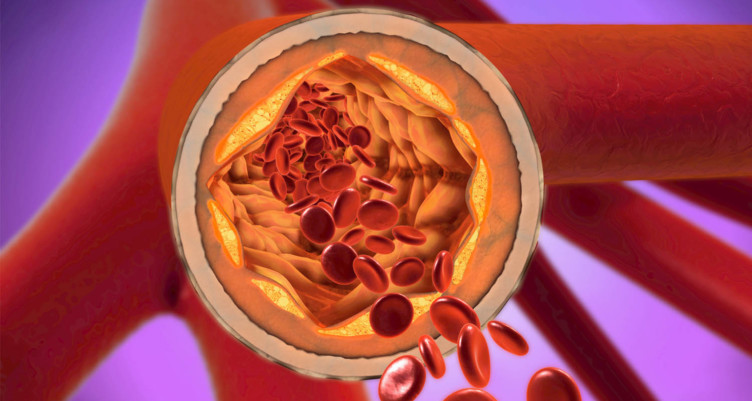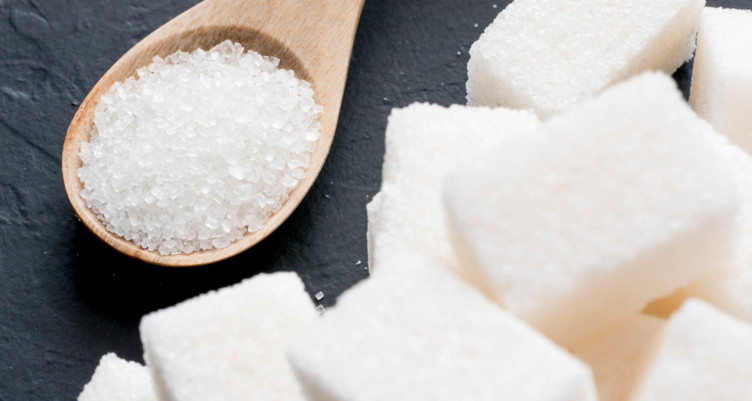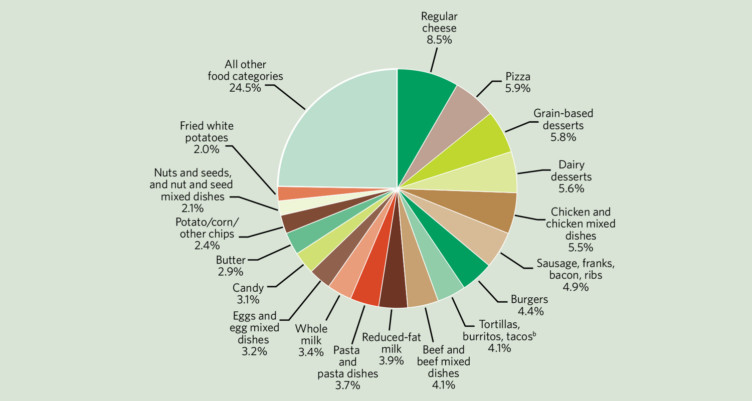Is Saturated Fat Bad for You? Here’s What You Need to Know

- Since the 1960s, saturated fat has had a reputation for causing heart disease and obesity. It turns out, that’s not true.
- Saturated fat’s reputation is thanks to incomplete research and premature conclusions from government policymakers. There was even a bit of corporate deception from the sugar industry to make saturated fat look bad instead of sugar.
- Saturated fat is essential to brain function and cell membrane integrity, and is a great source of energy on a high-fat diet as long as you’re getting it from quality sources (check the graph below and you’ll see that most people aren’t).
You probably grew up hearing that saturated fat is bad for you — that it damages your heart and drives weight gain. Fat, especially the saturated kind, has been labeled unhealthy ever since the 1960s, thanks to a combination of incomplete research and premature conclusions from policymakers. There was even a touch of corporate deception involved (more on that in a second) to demonize saturated fat.
Now, research is finally showing that a high-fat diet is good for you, and that saturated fat is not the bad fat behind the obesity and heart disease epidemic sweeping the Western world.
Here’s a look at why saturated fat has been maligned as unhealthy for more than 50 years, what the new research says about saturated fat, and why you can feel good about making meat, butter, coconut oil, and (if you tolerate it) full-fat dairy staples of your diet.
How did saturated fat get such a bad reputation?
 Saturated fat’s bad reputation began back in the 1960s. U.S. President Dwight Eisenhower had had a heart attack in 1955. Heart health became top priority, and the government’s top researchers grew more and more desperate to come up with a solution to the growing rate of heart disease.
Saturated fat’s bad reputation began back in the 1960s. U.S. President Dwight Eisenhower had had a heart attack in 1955. Heart health became top priority, and the government’s top researchers grew more and more desperate to come up with a solution to the growing rate of heart disease.
The answer came from a scientist named Ancel Keys.[1] He had done some preliminary research about a possible connection between saturated fat consumption and heart disease. Keys developed his “diet-heart hypothesis” and took it to the public: the saturated fat in eggs, red meat, butter, and dairy was clogging the nation’s arteries. The answer was to follow a low-fat diet, and to get most of your fat from omega-6s, like those found in vegetable oil.
Keys was charismatic and politically savvy. He presented his results (which, remember, were preliminary) with absolute conviction. He also publicly mocked any hypothesis that contradicted his own. His combination of certainty and charm won the nation’s favor, and the government began recommending a low-fat diet with as little saturated fat as possible.
The trouble, which is just becoming clear to the general public, is that Ancel Keys’ research was deeply flawed. He combined poorly designed studies with misguided statistical analysis and heralded his findings as the absolute truth. Other researchers called Keys out on his shortcomings almost immediately,[2] but their critiques didn’t get enough attention to stop the diet-heart hypothesis from informing public policy. Scientists are still unpacking the inconsistencies and errors in Keys’ research today, and trying to reshape people’s perception of saturated fat.[3]
Related: Is Fat Good for You? Everything You Need to Know About Dietary Fats
Sugar lobbyists made saturated fat look bad, too
 The Sugar Research Foundation (SRF), a major lobbyist group for the sugar industry, was doing its own heart disease research during the 1950s and 1960s.[4]
The Sugar Research Foundation (SRF), a major lobbyist group for the sugar industry, was doing its own heart disease research during the 1950s and 1960s.[4]
The data did not suit the SRF’s agenda: their researchers found a strong correlation between sugar consumption and heart disease and cancer. But instead of reporting their findings, the SRF wrote a review article in 1965 that singled out saturated fat as bad, saying it was the main driver of heart attacks, with no mention of sugar.
The SRF also sponsored a research program in the ‘60s and ‘70s that downplayed the role of sugar in heart disease and promoted saturated fat as its cause instead.
This may sound like a conspiracy theory, but it’s not. In the early 2000s, researchers gained access to internal documents from the SRF and discovered that they were intentionally hiding evidence of the link between sugar and heart disease, while putting as much blame as possible on saturated fat. The researchers published a paper in 2016 detailing the whole affair.[5]
Related: Report: Sugar Industry Hid Study Linking Sugar to Heart Disease and Cancer
Their conclusion? “Policymaking committees should consider…studies appraising the effect of added sugars on multiple coronary heart disease biomarkers and disease development.”
In other words, it is time to take a closer look at sugar’s role in heart disease — especially when you consider that obesity rates have increased beyond anyone’s expectations, decade after decade, since the 1960s.[6]
As an interesting side note for men: a 2007 study tracked testosterone in men since the mid-80s; it found that the average serum testosterone level in men has also dropped about one percent every year[7] — during a time when low-fat diets were more and more standard. Considering sugar decreases testosterone levels dramatically,[8] and that cholesterol is the building block of sex hormones, there’s a strong case for cutting out sugar and increasing your fat intake.
Latest research shows no link between saturated fat and heart disease
 In the last ten years, four large-scale independent review articles (one including data from more than half a million participants) found no link between saturated fat and heart disease.[9][10][11][12]
In the last ten years, four large-scale independent review articles (one including data from more than half a million participants) found no link between saturated fat and heart disease.[9][10][11][12]
A 22-year study of saturated dairy fat consumption found no difference in risk between high-fat and low-fat consumers.[13] In fact, people who ate more butter had significantly higher levels of heptadecanoic acid, a saturated component of butterfat, and a 42% lower risk of stroke.
Related: Major, New Study: Stop Wasting Your Time Avoiding Saturated Fat
Another study (this one was in dolphins, not humans, but it’s still interesting) found that heptadecanoic acid reverses prediabetes and metabolic dysfunction.[14]
And when you consider the older studies that have found a link between saturated fat and heart disease, it’s worth noting where Americans get their saturated fat. Let’s break down this graph, adapted from national government data:[15]

- 37.5% of Americans’ saturated fat intake comes from pizza, ice cream, grain-based desserts like cookies and cake, processed meat, burritos, fries, pasta dishes, candy, and chips.
- 24.5% comes from the nonspecific “All other food categories.”
- Only 24% of Americans’ saturated fat comes from whole foods like beef, eggs, cheese, butter, and nuts.
Which begs the question: in studies that have found a link between saturated fat and heart disease, is it the saturated fat itself? Or is it the fact that the saturated fat is coming from processed junk food, like pizza, ice cream, cookies, cake, and candy?
This is the problem with correlational studies. There are so many confounding factors that it’s nearly impossible to come to a meaningful conclusion.
Researchers have tried to find a mechanistic link between saturated fat and heart disease in mice (it’s hard to do in humans, because you can’t just start feeding people food with the goal of seeing whether they’ll become obese and die). Generally, mice on a high-saturated-fat diet gain tons of weight and develop heart problems…but mice evolved to eat grain, not fat, and they do notoriously poorly on high-fat diets. To quote the authors in a recent study:[16]
“The high fat-fed mouse is a widely investigated model of obesity, insulin-resistance and susceptibility to diabetes…when subjected to high dietary fat, [it] shows increased consumption, increased efficiency of fat storage (weight gained/calorie) and becomes insulin resistant.
As a model of human obesity and insulin resistance, however, it suffers from the severe, if under-emphasized, limitation that high-fat diets do not generally cause these conditions in humans unless the diets are also high in carbohydrate.”
In other words, it’s hard to study saturated fat and heart disease in mice and draw any meaningful conclusions.
It’s frustrating that saturated fat is labeled so conclusively as a cause of heart disease, when nutritional studies on saturated fat are questionable at best and outright misleading at worst. In fact, there’s a solid case that saturated is quite good for you.
Why saturated fat is good for you (and you should eat plenty of it)
 Saturated fat has a few unique characteristics that make it a valuable addition to your diet. It’s the most stable of all fats, which makes it essential to keeping your cell membranes strong. Saturated fat makes up nearly 50% of all cell membranes in your body, and the majority of fats in your brain are saturated.[17]
Saturated fat has a few unique characteristics that make it a valuable addition to your diet. It’s the most stable of all fats, which makes it essential to keeping your cell membranes strong. Saturated fat makes up nearly 50% of all cell membranes in your body, and the majority of fats in your brain are saturated.[17]
Saturated fat’s stability also makes it an ideal fat for cooking. More fragile fats like omega-3s, omega-6s, and monounsaturated fats break down and become inflammatory when you expose them to heat (here’s a guide to the different types of fat). Saturated fats like lard, tallow, coconut oil, and ghee, on the other hand, maintain their integrity, even when you heat them to roughly 400 degrees Fahrenheit. They’re perfect for pan frying and baking.
Plus, saturated fat is a solid source of energy, especially if you aren’t eating many carbs, and it’s in a lot of delicious nutrient-dense foods. Bulletproof sources of saturated fat include:
- Grass-fed meat
- Grass-fed butter
- Grass-fed, full-fat dairy (if you tolerate it; many people don’t)
- Pasture-raised eggs
- Pasture-raised pork, including bacon
- Coconut oil
For a complete list of Bulletproof fat sources, check out the free one-page Bulletproof Diet Roadmap. And don’t worry about eating saturated fat. It’s a great (and delicious) source of energy that easily earns its place in a high-fat, low-carb diet.
Sign up for early access to sales, product launches, the latest Bulletproof news and more!



